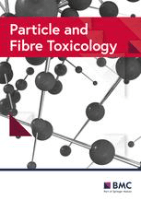
Particle and Fibre Toxicology
Scope & Guideline
Leading the charge in toxicological research.
Introduction
Aims and Scopes
- Toxicological Assessments of Particulate Matter:
The journal frequently publishes research examining the toxicological effects of various particulate matter, including nanoparticles and fibers, on biological systems, emphasizing methodologies such as in vivo and in vitro studies. - Mechanistic Insights into Particle-Induced Toxicity:
Research articles often delve into the cellular and molecular mechanisms through which particulate matter induces toxicity, inflammation, and other adverse health effects, contributing to a deeper understanding of these processes. - Multidisciplinary Approaches to Nanotoxicology:
The journal encourages studies that utilize multidisciplinary approaches, integrating toxicology, pharmacokinetics, and epidemiology to assess risks associated with exposure to engineered nanomaterials and environmental pollutants. - Impact of Environmental and Dietary Factors on Toxicity:
There is a consistent focus on how environmental pollutants, including diesel exhaust and microplastics, interact with dietary factors to influence health outcomes, particularly in vulnerable populations. - Innovative Methodologies for Risk Assessment:
The journal highlights innovative methodologies for risk assessment, including high-throughput screening and omics technologies, to evaluate the health effects of emerging particulate contaminants.
Trending and Emerging
- Microplastics and Their Health Impacts:
Research on the health effects of microplastics has surged, reflecting growing public and scientific concern over their ubiquitous presence in the environment and potential toxicity. - Nanomaterials and Targeted Toxicity Mechanisms:
A significant increase in studies focusing on the specific mechanisms of toxicity associated with various nanomaterials, including their interactions at the cellular level, has been noted, indicating a deeper exploration of their health risks. - Impact of Environmental Pollutants on Chronic Diseases:
Emerging themes are focusing on the links between exposure to environmental pollutants, such as diesel exhaust, and chronic diseases, including cardiovascular conditions and metabolic disorders, emphasizing the long-term health implications. - Sex Differences in Toxicological Responses:
There is a growing interest in understanding the role of sex differences in the toxicological responses to particulate matter, as evidenced by studies examining how hormonal variations affect susceptibility to toxicity. - Integrated Risk Assessment Frameworks:
The development and application of integrated risk assessment frameworks that combine data from various sources, including epidemiological studies and mechanistic insights, are becoming increasingly prominent, signaling a shift towards holistic approaches in toxicology.
Declining or Waning
- Traditional Toxicology Studies Without Modern Techniques:
There is a noticeable decrease in the publication of studies relying solely on traditional toxicology methods without integrating modern techniques such as omics approaches or advanced imaging, indicating a shift towards more innovative methodologies. - Limited Focus on Non-Respiratory Health Effects:
Research specifically targeting non-respiratory health impacts of particulate matter exposure, such as gastrointestinal or skin effects, has become less frequent, suggesting a narrowing of focus towards pulmonary and systemic effects. - Studies Concentrating Solely on In Vitro Models:
The publication of studies that exclusively utilize in vitro models without corroborating in vivo findings has diminished, reflecting a preference for comprehensive studies that bridge laboratory results with real-world implications.
Similar Journals

JOURNAL OF APPLIED TOXICOLOGY
Elevating Standards in Toxicological ResearchJOURNAL OF APPLIED TOXICOLOGY, published by Wiley, stands as a leading platform in the field of toxicology, focusing on the rigorous examination of chemical substances and their effects on biological systems. With an impressive Impact Factor, it ranks in the top quartile (Q2) for toxicology journals, reflecting its esteemed position within the scientific community. The journal, identifiable by its ISSN 0260-437X and E-ISSN 1099-1263, has been an invaluable resource since its inception in 1981, and it continues to serve as a conduit for innovative research and practical applications through 2024. Positioned at the forefront of the field, it garners recognition in the Scopus Rankings, where it ranks #31 out of 133 journals in the toxicology category, placing it in the 77th percentile—a testament to its contribution to the advancement of pharmacology and toxicological sciences. While not an open-access journal, it remains accessible to a wide audience of researchers, professionals, and students eager to explore cutting-edge findings in applied toxicology, making it a pivotal resource for enhancing knowledge and fostering collaboration in the field.
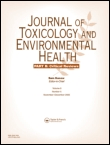
JOURNAL OF TOXICOLOGY AND ENVIRONMENTAL HEALTH-PART B-CRITICAL REVIEWS
Transforming environmental health through critical analysis.Welcome to the JOURNAL OF TOXICOLOGY AND ENVIRONMENTAL HEALTH-PART B-CRITICAL REVIEWS, a prestigious publication under TAYLOR & FRANCIS INC based in the United Kingdom. With an impressive impact factor and ranked in the Q1 category for both Health, Toxicology and Mutagenesis, and Toxicology, this journal provides critical insights into the fields of toxicology and environmental health. Since its inception in 1998, it has become a key resource for researchers, professionals, and students, offering rigorous peer-reviewed articles that synthesize and critically appraise current knowledge in the discipline. The journal is recognized globally, ranking #5 in Toxicology and #12 in Environmental Science according to Scopus, highlighting its crucial role in advancing research and understanding in these essential areas. The journal also embraces open access options, making it easier for a broader audience to access vital research findings. Engage with the latest developments and critical analyses that are shaping the future of environmental health and toxicology by exploring our comprehensive collection of reviews and articles.

Food Additives and Contaminants Part A-Chemistry Analysis Control Exposure & Risk Assessment
Exploring the chemistry behind food safety and public health.Food Additives and Contaminants Part A-Chemistry Analysis Control Exposure & Risk Assessment, published by Taylor & Francis Ltd, is a leading journal in the field of food science, toxicology, and public health. With an ISSN of 1944-0049 and an E-ISSN of 1944-0057, this esteemed publication has established itself as a vital resource for researchers and professionals involved in the analysis and regulation of food additives and contaminants. Since its inception and through its converged years from 2008 to 2012 and again from 2014 to 2023, the journal has maintained an impactful presence, notably achieving a Q2 ranking in diverse categories including Chemistry (miscellaneous) and Food Science, alongside commendable standings in Health and Environmental Health. The journal’s mission is to foster high-quality research by providing a platform for critical studies related to chemical analysis, exposure assessments, and risk management in food safety. By prioritizing engaging, peer-reviewed content, it aims to enhance understanding and mitigate risks associated with food additives, making it an indispensable tool for academics, practitioners, and policymakers alike.
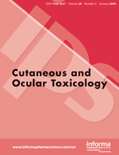
Cutaneous and Ocular Toxicology
Connecting researchers to the world of toxicology.Cutaneous and Ocular Toxicology, published by Taylor & Francis Ltd, is an essential resource in the fields of toxicology and pharmacology, focusing specifically on the effects of substances on the skin and eyes. With an ISSN of 1556-9527 and an E-ISSN of 1556-9535, this journal has been a vital platform for disseminating research since its inception in 1982, continuing its contributions to the scientific community through to 2024. Recognized for its academic rigor, it currently holds a Q3 ranking in the Medicine (miscellaneous) and Toxicology categories, reflecting its value among researchers and practitioners. The open access option enhances the journal's visibility and allows wider dissemination of knowledge, making it a key resource for professionals, students, and researchers dedicated to understanding and mitigating toxicological effects. Situated in the United Kingdom, Cutaneous and Ocular Toxicology strives to foster interdisciplinary collaboration and elevate the standards of toxicological research.

Toxicology Research
Unveiling the complexities of toxic substances.Toxicology Research is a distinguished journal dedicated to advancing the field of toxicology through the dissemination of high-quality research. Published by Oxford University Press, this UK-based journal focuses on critical aspects of toxicology and mutagenesis, highlighting both environmental and pharmacological implications. With an ISSN of 2045-452X and an E-ISSN of 2045-4538, it serves as a valuable resource for researchers, professionals, and students alike. Currently categorized in the Q3 quartile for Health, Toxicology and Mutagenesis, as well as Toxicology in 2023, Toxicology Research maintains a visible presence in Scopus rankings, positioning itself within the targeted professional community. Although the journal operates without open access options, its importance in contributing to scientific discussions and policy formation is undeniable. Covering content from 2012 to 2024, it continues to provide insights into contemporary toxicological challenges, thereby fostering interdisciplinary collaborations and informing best practices in health and safety.
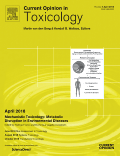
Current Opinion in Toxicology
Illuminating Critical Perspectives in ToxicologyCurrent Opinion in Toxicology is a premier academic journal published by Elsevier, focusing on the latest advancements and perspectives in the field of toxicology. With an impressive impact factor reflecting its high citation and influence within the research community, this journal ranks in the Q1 category for Toxicology, positioned at #8 out of 133 in the Scopus Toxicology domain, placing it in the 94th percentile. The journal aims to provide concise and insightful reviews of contemporary research, fostering an understanding of critical issues related to toxic effects of chemicals and environmental agents. Although not an open access journal, it attracts a worldwide readership, making it an essential resource for researchers, professionals, and students committed to understanding toxicological science. Based in the Netherlands, Current Opinion in Toxicology serves as a platform for stimulating scholarly dialogue and guiding future research directions in this vital area of study.
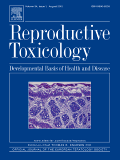
REPRODUCTIVE TOXICOLOGY
Advancing knowledge on reproductive health and toxicology.REPRODUCTIVE TOXICOLOGY, published by Pergamon-Elsevier Science Ltd, stands as a pivotal journal in the field of toxicology, specifically focusing on the effects of environmental and pharmaceutical agents on reproductive health. Established in 1987, the journal has a rich history of contributing to the scientific community, and it continues to publish rigorous research and reviews that illuminate the intricate relationships between various toxicants and their reproductive impacts. With an impressive 2023 Q2 ranking in Toxicology and a Scopus ranking of #42 out of 133 in the Toxicology category, REPRODUCTIVE TOXICOLOGY emphasizes high-quality scholarly work that influences both academia and industry practices. Researchers, professionals, and students in toxicology, pharmacology, and public health will find this journal an invaluable resource for staying informed on the latest findings and methodologies in reproductive toxicology. While the journal currently adheres to traditional publishing models without open access options, its authoritative content remains accessible to a global audience interested in advancing the understanding of toxicological impacts on reproduction.
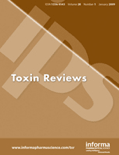
Toxin Reviews
Pioneering Insights in Toxicology Since 1982Toxin Reviews is a premier academic journal focused on the critical field of Toxicology, published by Taylor & Francis Inc. Established with an aim to foster research and disseminate knowledge, this journal has been pivotal since its inception in 1982 and continues to be a leading platform for both emerging and established researchers. With an impressive impact factor and ranked in the 75th percentile among its peers in the Scopus categories, it serves as an essential resource for scientists, practitioners, and students interested in understanding the complexities of toxins and their effects on health. The journal provides an Open Access platform, enhancing visibility and accessibility of research findings to a broader audience. Covering a wide scope, Toxin Reviews plays a vital role in bridging gaps between toxicological research and practical applications, ensuring that rigorous scientific inquiry translates into real-world solutions.
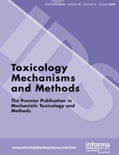
TOXICOLOGY MECHANISMS AND METHODS
Pioneering the future of toxicological science.TOXICOLOGY MECHANISMS AND METHODS is a distinguished peer-reviewed journal dedicated to the advancement of toxicological research, published by Taylor & Francis Ltd. With its ISSN 1537-6516 and E-ISSN 1537-6524, this esteemed journal features critical studies and innovative methodologies in the field of toxicology, aligning with its mission to enhance understanding of biological mechanisms and risk assessment. The journal holds a commendable Q2 ranking in both the Health, Toxicology and Mutagenesis, and Toxicology categories, as well as strong positions in Scopus rankings, reflecting its influence with a 71st percentile rank in Toxicology and a 69th percentile rank in Environmental Health. Researchers, professionals, and students in the toxicology domain will find this journal to be an invaluable resource, offering open access options that foster widespread dissemination of its findings. Since its inception, encompassing converged years from 1991 to 1995 and from 2002 to 2024, the journal remains at the forefront of critical discourse and innovative research methods, making it a vital platform for advancing toxicological science globally.

TOXICOLOGY AND APPLIED PHARMACOLOGY
Unraveling the Complexities of Drug InteractionsTOXICOLOGY AND APPLIED PHARMACOLOGY, published by Academic Press, Inc. Elsevier Science, stands as a leading journal in the domains of toxicology and pharmacology, with its establishment dating back to 1959. With an impact factor reflecting its academic rigor and relevance, this journal is classified in the Q2 quartile for both pharmacology and toxicology categories, underscoring its significance in the scientific community. It ranks #34 out of 133 in Toxicology and #95 out of 313 in Pharmacology according to Scopus, placing it within the 74th and 69th percentiles, respectively. The journal aims to disseminate quality research that drives advancements in understanding the interactions of drugs and toxic substances within biological systems. Researchers and professionals are invited to contribute and engage with a broad spectrum of articles that cover mechanistic studies, risk assessment, and innovative therapeutic strategies. Although the journal does not offer open access, it continues to be a crucial resource for those who seek to navigate the complex interface of drugs and their toxicological implications.